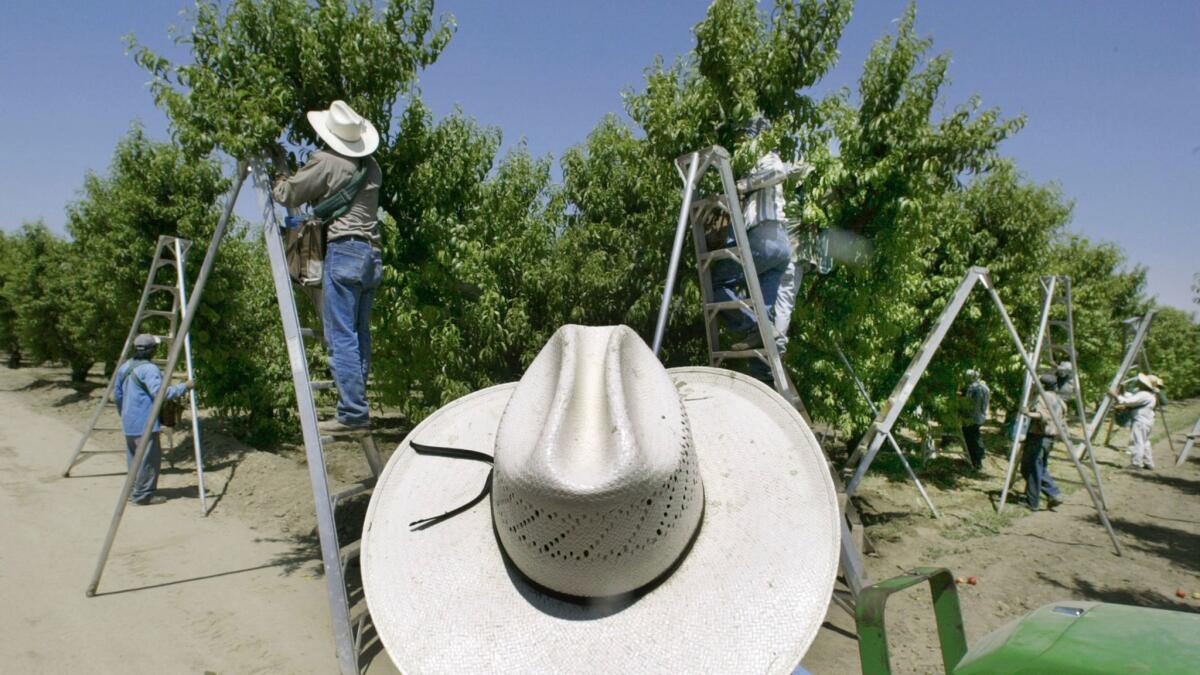States join fight over EPA chief’s decision not to ban pesticide that can harm children’s brains

- Share via
Several states are seeking to join a legal challenge to a Trump administration decision to keep a widely used pesticide on the market despite studies showing it can harm children’s brains.
Led by New York, the coalition filed a motion Wednesday to intervene in a legal fight over the continued spraying of chlorpyrifos on food. Massachusetts, Maryland, Vermont, Washington and the District of Columbia are also seeking to join the suit, which is pending before the U.S. Court of Appeals for the Ninth Circuit in San Francisco.
The states allege that Environmental Protection Agency chief Scott Pruitt violated the law by ending his agency’s effort to ban the pesticide sold by Dow Chemical Co. after federal scientists concluded it can interfere with the brain development of fetuses and infants. Federal law requires the EPA to ensure that pesticides used on food in the United States are safe for human consumption — especially by children, who studies show are typically far more sensitive to negative effects from pesticides.
“Job No. 1 for the EPA should be protecting Americans’ well-being, especially that of our children,” New York Atty. Gen. Eric Schneiderman said in announcing the legal action. “Yet the administration is jeopardizing our kids’ health, allowing the use of a toxic pesticide for which it can’t even identify a safe level.”
The EPA said Thursday that it was reviewing the lawsuit.
Pruitt told Congress last month that his decision was based on “meaningful data and meaningful science.” Despite repeated requests, the EPA has not provided the Associated Press with copies of any scientific studies Pruitt consulted in determining the pesticide is safe.
Public-health advocates have been pushing for years to ban chlorpyrifos, which is commonly sprayed on citrus fruits, apples, cherries and other crops. Lawyers for Dow and the makers of two other organophosphate pesticides also asked the Trump administration “to set aside” the results of government studies showing they pose a risk to nearly every federally protected endangered species.
Last month, the American Academy of Pediatrics also urged the EPA to ban chlorpyrifos. The group, representing more than 66,000 pediatricians and pediatric surgeons, said it is “deeply alarmed” by Pruitt’s decision to allow the pesticide’s continued use.
Dow, which sells chlorpyrifos through its subsidiary Dow AgroSciences, did not immediately comment Thursday. In the past, the company has said it helps American farmers feed the world “with full respect for human health and the environment.”
Spending more than $13.6 million on lobbying in 2016, Dow has long wielded substantial political power in Washington. Dow Chief Executive Andrew Liveris is a close advisor to President Trump, and the company gave $1 million for Trump’s inaugural activities.
Similar to a chemical spray developed as a weapon prior to World War II, chlorpyrifos has been sold by Dow for use on farms since the 1960s. It is now among the most widely used agricultural pesticides in the United States, with about 5 million pounds sold domestically each year.
As a result, traces of the chemical are commonly found in sources of drinking water. A 2012 UC Berkeley study found that 87% of umbilical-cord blood samples tested from newborn babies contained detectable levels of chlorpyrifos.
Under pressure from federal regulators over safety concerns, Dow voluntarily withdrew chlorpyrifos for use as a home insecticide in 2000. The EPA also placed “no-spray” buffer zones around sensitive sites, such as schools, in 2012. But a coalition of advocacy groups including the Natural Resources Defense Council and the Pesticide Action Network said those proposals don’t go far enough and filed a federal lawsuit seeking a national ban on the pesticide.
In October 2015, the Obama administration proposed banning use of the pesticide on food. A risk assessment memo issued in November by nine EPA scientists concluded: “There is a breadth of information available on the potential adverse neurodevelopmental effects in infants and children as a result of prenatal exposure to chlorpyrifos.”
More to Read
Inside the business of entertainment
The Wide Shot brings you news, analysis and insights on everything from streaming wars to production — and what it all means for the future.
You may occasionally receive promotional content from the Los Angeles Times.










